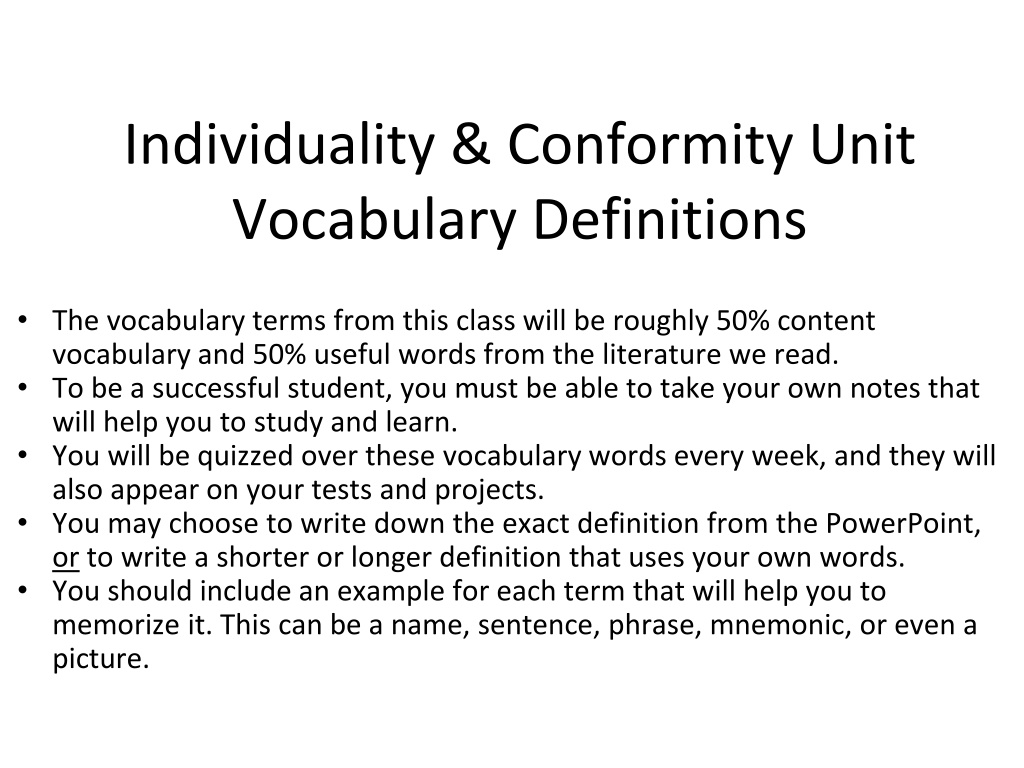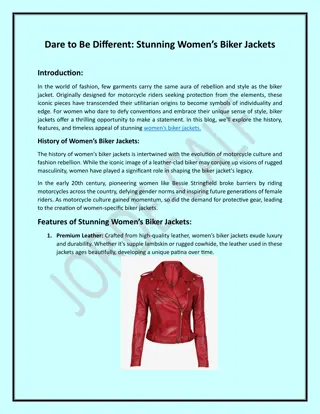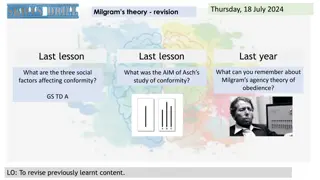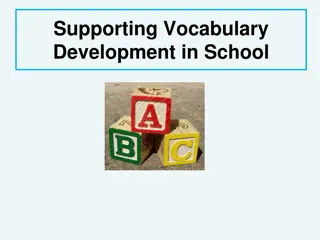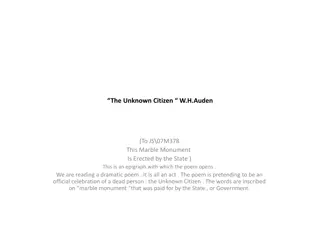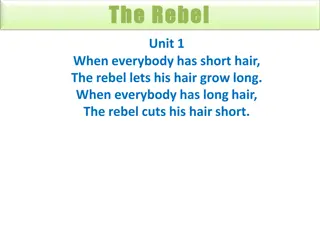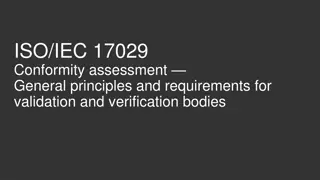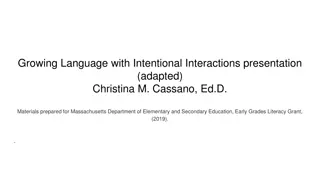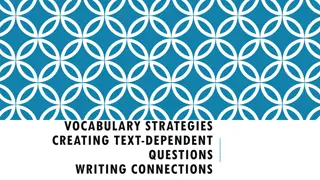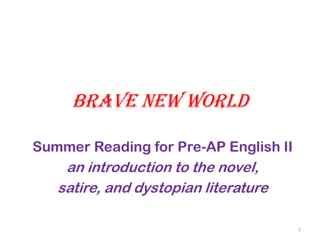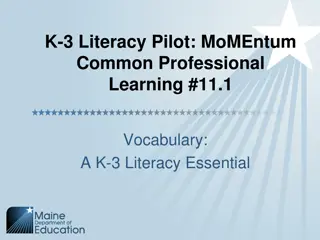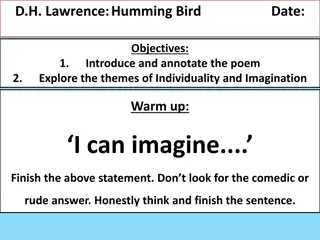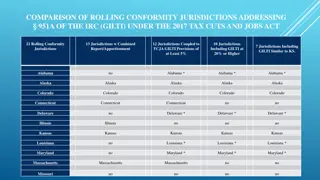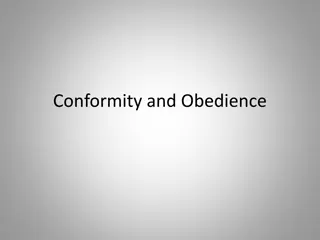Individuality & Conformity: Unit Vocabulary
Key terms from the unit including individualism, collectivism, conformity, and more. Understand definitions with examples to enhance retention for quizzes and tests. Discover literary terms like direct characterization, irony, and textual evidence with practical explanations. Improve note-taking skills and study techniques to excel academically in understanding the balance between individuality and conformity.
Uploaded on Feb 26, 2025 | 0 Views
Download Presentation

Please find below an Image/Link to download the presentation.
The content on the website is provided AS IS for your information and personal use only. It may not be sold, licensed, or shared on other websites without obtaining consent from the author.If you encounter any issues during the download, it is possible that the publisher has removed the file from their server.
You are allowed to download the files provided on this website for personal or commercial use, subject to the condition that they are used lawfully. All files are the property of their respective owners.
The content on the website is provided AS IS for your information and personal use only. It may not be sold, licensed, or shared on other websites without obtaining consent from the author.
E N D
Presentation Transcript
Individuality & Conformity Unit Vocabulary Definitions The vocabulary terms from this class will be roughly 50% content vocabulary and 50% useful words from the literature we read. To be a successful student, you must be able to take your own notes that will help you to study and learn. You will be quizzed over these vocabulary words every week, and they will also appear on your tests and projects. You may choose to write down the exact definition from the PowerPoint, or to write a shorter or longer definition that uses your own words. You should include an example for each term that will help you to memorize it. This can be a name, sentence, phrase, mnemonic, or even a picture.
Week 1 1. Individualism: the belief that the needs of each person are more important than the needs of the whole society/group; the actions or attitudes of a person who does things without being concerned about what other people will think Collectivism: the belief that the needs of a whole society/group are more important than the needs of a single person Conformity: Behavior that is the same as that of most other people in your society/group; behavior that meets other people s expectations Prudent: wise Transient: short-lived; not lasting a long time; fleeting Usurp: to take something that does not belong to you Tyrant: a ruler who uses their absolute power to take advantage of people; a cruel, oppressive ruler Absolve: to declare someone free from guilt, blame, or responsibility 2. 3. 4. 5. 6. 7. 8.
Week 2 1. Direct characterization: when the author describes a character (TELLS) Indirect characterization: when the reader learns about a character through their words, actions, thoughts, or interaction with others (SHOWS) Irony: when there is a contrast between expectation and reality Verbal Irony: saying the opposite of what you mean Dramatic Irony: Occurs when the reader knows something the character doesn t Situational Irony: when what happens is the opposite of what the reader or character expected 7. Ambiguity: when something can be read, understood, or interpreted in more than one way (adjective form = ambiguous) 8. Repress: to control someone/something; to prevent someone/something from reaching their full potential 2. 3. 4. 5. 6.
Week 3 1. 2. Text: a written work, such as a story, article, poem, book, or play Textual evidence: a specific example or quotation from the text that supports your argument Concrete detail: (CD) a fact, example, or claim Parenthetical documentation: (P-DOC) a citation inside parentheses () that comes at the end of a sentence with textual evidence. In MLA format, it includes the author s last name and the page number where the information appeared. Ex: Lily says, Poor Miss May (Kidd 51). Commentary: (CM) A sentence explaining why the CD or textual evidence is important. Summarize: to give a shorter statement of the main idea in your own words Paraphrase: to restate someone else s ideas in your own words Direct quotation: using someone else s language word-for- word 3. 4. 5. 6. 7. 8.
Week 4 1. Arbitrary: based on random choice or personal whim, rather than any reason or rule Degrade: to lower in quality, status, or rank Oppress: to crush or burden with the abuse of power or authority Assert: to behave in a way that expresses your confidence, importance, or power Comply: to follow a rule; to act according to expectations Solidarity: a feeling of unity based on common goals and interests Benign: gentle, kind, harmless Pathological: harmful; so extreme that it is abnormal or possibly caused by disease 2. 3. 4. 5. 6. 7. 8.
Week 5 1. Alliteration: repetition of beginning sounds Jamba Juice, school spirit 2. Parallelism: Using similar grammatical structures in repeated phrases, sentences, or lines I came, I saw, I conquered The bigger they are, the harder they fall 3. Inversion: changing word order to emphasize the words at the end of the sentence 4. Figurative language: language that has a meaning other than its literal meaning simile, metaphor, #6 & 7, etc. 5. Personification: describing a non-human entity as if it were human 6. Hyperbole: describing something as larger or more important than it really is; exaggeration 7. Sensory detail: a detail that appeals to one of the five senses (sight, smell, taste, touch, or sound) 8. Imagery: language that creates an image in the reader s mind
Week 6 1. Assonance (n): repetition of vowel sounds (making bacon pancakes) Consonance (n): repetition of consonant sounds Allegory (n): A story that has both a literal meaning (its plot) and a symbolic meaning (something it represents or stands for) Paranoia (n): extreme, irrational distrust or suspicion of others Persecution (n): hostility or ill treatment, often due to being different Afflict (v): to cause pain or harm to someone Construe (v): to understand or interpret something in a particular way, such as clues, words, or actions Hysteria (n): a situation in which many people behave or react in an extreme or uncontrolled way because of fear, anger, etc. 2. 3. 4. 5. 6. 7. 8.
Week 7 1. Drama: literature written to be performed; plays 2. Dialogue: conversation between 2 or more characters 3. Monologue: a speech by one character which other characters can hear 4. Soliloquy: a speech by one character which is not heard by other characters 5. Aside: a short comment made by a character to the audience, which other characters cannot hear 6. Overture: an introduction to the rest of the play 7. Stage directions: directions that tell the director and actors what to do; not meant to be read aloud.
Week 8 1. Essay writing terms
